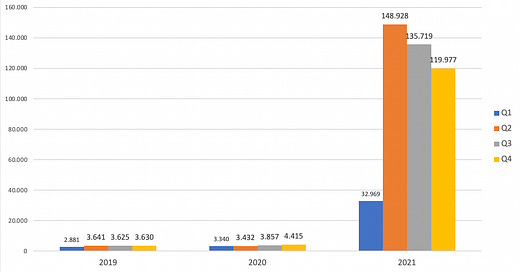

Discover more from From Symptoms to Causes
When I Lost My Sense of Claret
We cannot be thankful enough to those who have tried to protect us against the "deadly virus" and the truly devastating consequences of "long-Covid".
According to an old Icelandic rhyme, the food offered in Paradise consisted of claret, fat and bone-marrow; fitting for a nation on the outskirts of the habitable world, hungry and cold, and usually painfully sober, for hundreds of years, subsisting on dried fish mostly and the odd stranded whale when lucky, but when times were really bad, on their own sheepskin shoes. In fact some say they even feasted on the ancient calfskin manuscripts of the famous Icelandic Sagas, most of which still fortunately made it through the famines of olden days, to be enjoyed today, perhaps over a glass of claret, though not with it.
I caught Covid in November 2021. Two weeks of really nasty flu, unusual for the lack of bone aches and sore throat; mostly I felt exceedingly tired. It then wore off. I survived; one of the lucky few, some said.
Back then, the long-Covid scare was at its height. Lengthy lists of gruesome symptoms in the media every day, the most hyped-up one being “brain fog”. I never got “brain fog” and honestly I always thought this was a symptom mainly reserved for hairdressers, always dizzy from the fumes of their sprays, now finally finding a fashionably scientific explanation. A French study published days before I fell ill had found how none of the symptoms of long-Covid had anything at all to do with a Covid infection; they were however strongly linked with people’s belief in having had the disease, but without actually having had it, as confirmed by most later studies and conscientously refuted by "fact-checkers" of course.
None? Well, almost none. The study did in fact find a correlation between the disease and one of the purported symptoms; a loss of the sense of smell and taste. And this is where my woes began.
As a believer in science - real science, not The Science - of course I didn’t escape that single real long-Covid symptom. For a long time after I recovered, food smelled and tasted strange. My homemade sauce Bernaise, my pride and joy in the kitchen, now had a strange metallic taste to it. Truffles smelled like mould, garlic smelled of nothing. This went on for a few months. Then I gradually got my sense of smell and taste back. Almost. For one, but all-important sub-symptom lingered. And the fact that the French researchers didn’t thoroughly discuss, rigorously classify and highlight this specific sub-symptom is utterly beyond me; them being French, it really makes no sense.
For I lost my “sense of claret”: I couldn’t any more distinguish between a 2005 second growth Haut-Médoc and a 2019 cru bourgeois Graves. Both smelled like sulphur, both tasted like watered-down fruit juice gone a bit bad: I couldn’t drink claret any more.
I had always loved claret. Always enjoyed tasting and comparing the different vintages, pairing the different régions with different kinds of food; St-Julien with this, St. Emilion with that, Pessac-Léognan with this... Selecting the correct claret with the Sunday meal used to be the highlight of the week. But come long-Covid, no more.
When claret is out of the question one has two choices only. Either give up on wine, or try a different region. Obviously the next in line was Burgundy. I wasn’t all that hopeful of course when carefully sampling the first bottle. But what a miracle: The young Côtes de Beune I had selected smelled and tasted just like a young Côtes de Beaune should. Jumping with joy I headed straight back to the wine store. Sampling some more, I found I could still appreciate the difference between a mature Côte de Nuits and a young Nuits Saint-George. My favorite Pomerol now being off limits, I could instead enjoy a decent Gevrey-Chambertin with the poulet truffée.
Months later, to my great relief, I finally regained my "sense of claret." But I still open the odd Burgundy, after all they came to my rescue during the long dark days of long-Covid.
I sometimes wonder, had I not been among the lucky few who survived the "deadly virus", would I now be enjoying my claret with the fat and marrow in Paradise? Or would my immortal soul be eternally beset with that dreadful loss of the sense of claret?
















Fascinating and your vivid description makes me wonder if Covid really was a toxin release or radiation poisoning of some sort as evidenced by your metallic taste. Another common symptom I’m hearing about is hair loss and that also brings to mind poisoning rather than infection!
Good thing you are a writer and not a perfumer designing nuanced fragrances. In France you'd be referred to as a "nose" with a fine sense of smell. Years ago, I read a novel about a perfumer who lived in France during the early 18th Century. From the authors description of the unsanitary conditions you can understand why snuff was a savior.
Anyway, the loss of smell associated with COVID is also prevalent when you're heavily congested and your nose is stuffed.
I clearly remember, as a child losing my taste and sense of smell every time I contracted a very bad cold. So those symptoms are not new. I'm not even convinced "long COVID" actually exists as there was so much hype triggering "COVID anxiety."
In fact, they say folks rushed to emergency rooms thinking they had COVID because of a shortness of breath, but it was just an anxiety attack.
Imagine, being intubated because you were just anxious and the hospitals were determined to secure another dime. An awful circumstance which I understand occured in some disreputable medical facilities.